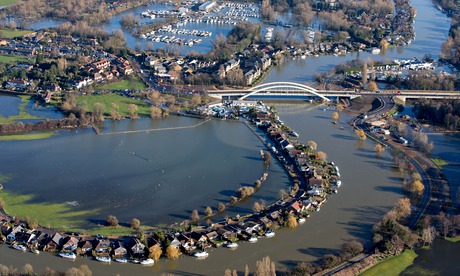Climate change is a rich topic to explore in the classroom. From science
and geography to politics, it's an area with roots in a range of
subjects and can be a great source for debate.
How to teach ... climate change
Climate
change is a rich topic to explore in the classroom. From science and
geography to politics, it's an area with roots in a range of subjects
and can be a great source for debate

Climate change has shown itself recently in the recent flooding across the UK. Photograph: Steve Parsons/PA.
Climate change takes on added significance this week as thousands of people across the UK take part in Climate Week, a national campaign to raise awareness of the issue and steps that can be taken to address it.
This
week we have a collection of resources to help your students explore
the wider issue of climate change and its potential impact.
For secondary pupils, start with the Met Office's Guide to Climate Science.
It answers a range of questions including: what is weather; what is
climate; has our climate changed before; and what could be the impact of
future climate change around the world? The guide is accompanied by a Weather and Climate presentation and teacher's notes. There is also a Climate Zones Poster that helps explain how human activity is leading to changes in weather and climate.
Have I Got Climate Science For You is an engaging interactive quiz from the Science Museum that asks students to apply their knowledge of climate change and think about its implications. There's also a climate report activity
designed to help students understand the difference between weather and
climate, and to consider the impact that climate change can have on
their and other people's lifestyles. Carbon Cycle Caper
is an activity in which students play out the carbon cycle, to
understand how it has been affected by our use of fossil fuels since the
industrial revolution and how this underlies current worries about
climate change.
Climate change controversies: A simple guide
provides a user-friendly overview of the scientific understanding of
climate change. Produced by the Royal Society, the document gives
answers to eight of the most commonly asked questions about the science
of climate change. There's also Climate Change: A Summary of the Science.
It looks at the current scientific evidence on climate change,
highlighting the areas where the science is well established, where
there is still some debate, and where substantial uncertainties remain.
Combating climate change is a resource from the EU Commission
that focuses on the EU's commitment to cut emissions of greenhouse
gases by at least 20% by 2020. It draws students' attention to ways of
using energy resources more sustainably, switching to more renewable
forms of energy, capturing and storing carbon dioxide and reversing
deforestation.
The Climate Change resource pack
includes an eight-page student booklet that features summaries of the
world's climate, the greenhouse effect, the human contribution to
climate change, the effects of climate change, and what can be done
about it, created by BP Educational Service.
Explore
the key causes of climate change by looking at and questioning a range
of perspectives and explanations with this resource, Make the Link Climate exChange - What is Climate Change.
Big Picture Health and Climate Change
is a magazine that explores the potential impact of climate change on
human health and includes interviews with people whose lives are
directly affected by climate change.
Oxfam have a variety of climate change resources for secondary students. The effects of climate change on the UK
aims to enable pupils to make connections between their own lives and
the issue of climate change by examining implications for the UK now and
in the future, while case studies are used to explore the Effects of climate change around the world. There's a climate change quiz and a presentation that explores the impact climate change is having on the world's poorest communities. There are also lots of ideas for taking action on climate change including organising film screenings and writing to your MP.
Pathways to education for sustainable development is a guide from the WWF
that offers a whole-school approach to addressing sustainability in
schools for staff who are interested in facilitating the process. The
guide can be used as a whole resource, or activities can be used alone.
The WWF has also created a teaching resource that looks at the impact of climate change on the Russian Arctic and paths to solving the problem. There's also a poster that explores climate change by looking at the impacts of human activity in Latin America and in the UK.
For more information, check out the Guardian's interactive resource, Everything you need to know about climate change.
On a lighter note, Ditty Box: Tackling Climate Change is a teaching resource from the Poetry Society giving an adaptable lesson plan by poet Karen McCarthy Woolf around creating list poems on the theme of climate change.
For primary pupils, Sunny Schools have created a pack of six lessons that look at topics including climate change, carbon footprints and renewable energy. The lessons can be used individually or together to create a whole topic. They are accompanied by activity sheets and photo-cards. There's also an activity which looks at different people's opinions about climate change.
And finally, Primary Leap
has created a number of reading comprehension tasks about extreme
weather events sometimes attributed to climate change. These include flooding, tornadoes and hurricanes.